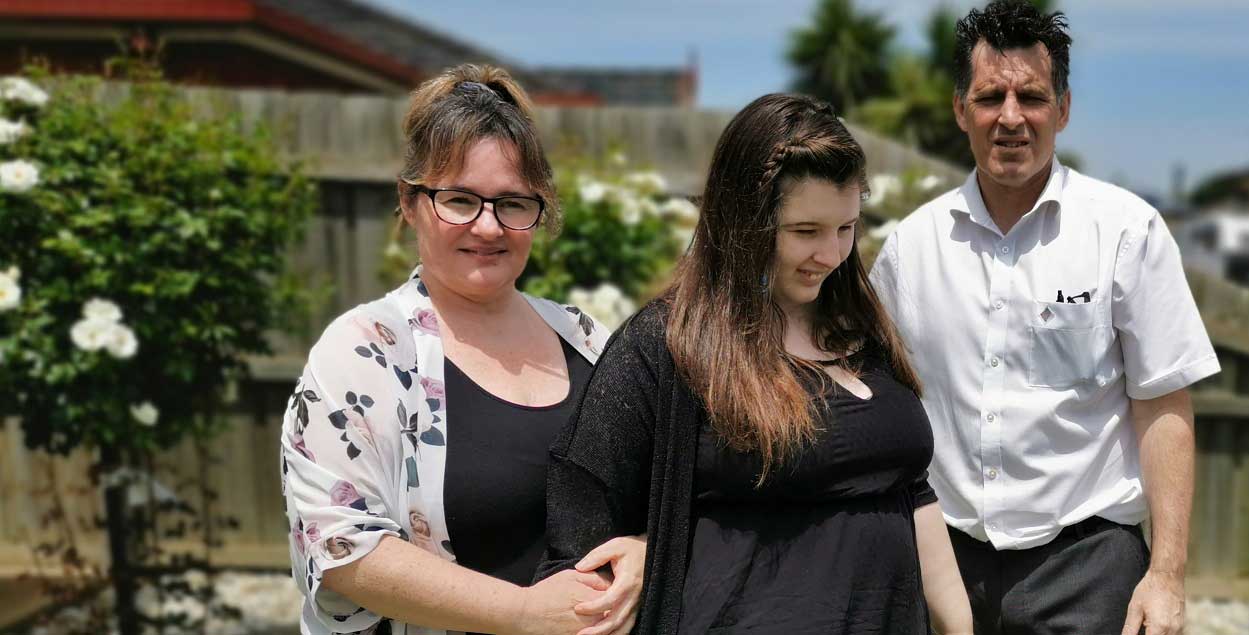A fresh approach to supported accommodation

Deb Fantella is preparing a simple list for her 24-year-old daughter’s imminent move out of the family home.
‘I’m listing everything that could be helpful for the carers; like, if you have to thaw meat, don’t leave it where she can see it because she will eat it, hide it in another room. Little things like that.’
While unfathomable for the majority of families, such considerations are the norm for the Fantellas.
The Corio family has become used to walking on eggshells as they navigate the manageable calms and violent storms of Amber, who is diagnosed with autism, is mostly non-verbal and has an intellectual disability.
‘It just builds and builds and builds,’ her dad, Murray, says of the strain on the family. ‘If it was just an hour it’s probably not a big deal, you can cope. But when it’s days in a row it just drains you mentally. It’s been difficult. There’s no other way you can put it.’
So when Amber was offered an independent living unit in a new supported accommodation development in Belmont, the Fantellas leapt at the unique opportunity for their daughter.
‘It’s not like we want to give her up because to us, that’s our last resort, but that’s probably where it was heading. So this has been really like a godsend,’ Murray says.
To open this month, the Gateways Support Services development is a transitional housing option for people with disability. Its purpose is to equip residents with the life skills needed to move into permanent independent housing of their choice with less intensive supports.
Gateways Accommodation Manager Sean Justin says the six units will provide a home for a range of people requiring transition support including young people moving from out-of-home care and getting their first taste of adult independence to others, like Amber, whose complex behaviours make shared accommodation unviable.
Designed by local architect Wendy Hastrich with funding from Adroit Insurance and the Geelong Community Foundation, Edmill will be a small and safe community with individual, self-contained units and common areas to socialise if residents choose to, all scaffolded by a rotating team of 20 around the clock support workers.
‘There’s housing that’s being built for people that have high physical support needs, but when you come to complex behaviours or other high levels of support there’s not a high growth in the amount of housing and options available,’ Sean says.
He says Edmill also aims to mitigate against the complexities of matching residents for compatibility which, for someone like Amber, would leave her ineligible for most other housing options.
Sean says that for families like the Fantellas, the lack of suitable housing options can be catastrophic as parents are worn down, suffer physical or mental illness and are no longer able to care for their child.
‘It’s no good for Amber having a loving family if one of those family members burn out, because you can’t recover from that. The system talks about Amber, but what about the family as a whole,’ Sean says.
‘There’s been a real change from the day I offered Amber a place; it’s rejuvenated them knowing they have a goal. I don’t think I could put into words what it might mean for the family.’
Over the years Amber’s needs have dictated every aspect of her family’s life, removing the spontaneity others take for granted.
It has meant Deb or Murray has had to stay home with Amber while the other attends social functions or takes siblings Sophie, now 19, and Trent, 16, to their various school functions and sporting events. It has also meant very few family holidays because of limited respite options.
Before her psychiatrist found the right medications to balance Amber’s moods and limit meltdowns, at least two people needed to be in a vehicle with her – one to drive and the other to stop her attacking the driver.
Being the smallest in the family, Deb often bears the brunt of a meltdown with Amber making a beeline for her, even in the middle of the night.
In the family home, the fridge, freezer and pantry are padlocked to prevent Amber indulging her favourite pastime: eating anything, whether raw, cooked or for pets only. Her bedroom walls are covered with plywood panels nailed to cover the holes made during meltdowns, while the window and door are also reinforced.
When calm, Amber likes to sit on the couch watching music videos or lie on her bed. She also enjoys attending Gateways Social Connect day programs where the support workers are attuned to adapting activities to her prevailing moods. One of her support workers has applied to work with Amber at Edmill, giving her familiarity and consistency of care.
Deb has noticed her daughter bringing home new life skills from occasional respite stays, something she hopes will build at Edmill.
‘I think that once she starts living in the unit the carers will get her to do more of the little things each day as well and I reckon that’s a big benefit for Amber because we know she can learn a lot of things,’ Deb says.
For the other family members, Amber’s move to Edmill will enable greater flexibility in their daily lives.
But while there will be positive changes and new opportunities for everyone, at the end of the day Deb and Murray are like any other parents adjusting to the prospect of their first-born leaving the family nest.
‘I don’t like to think about it too much. It’s very scary,’ says Deb. ‘I’m going to miss her.’
This article also appears in the autumn issue of Geelong and Surf Coast Living.



